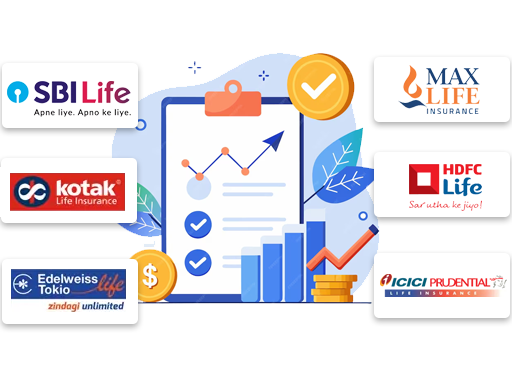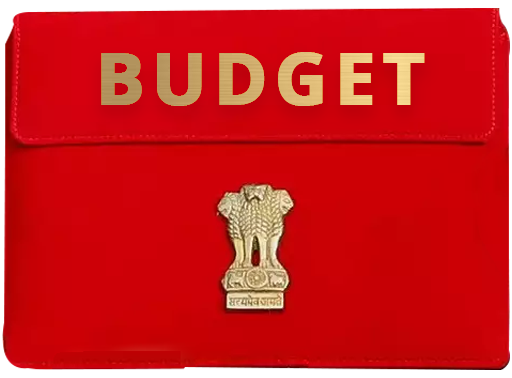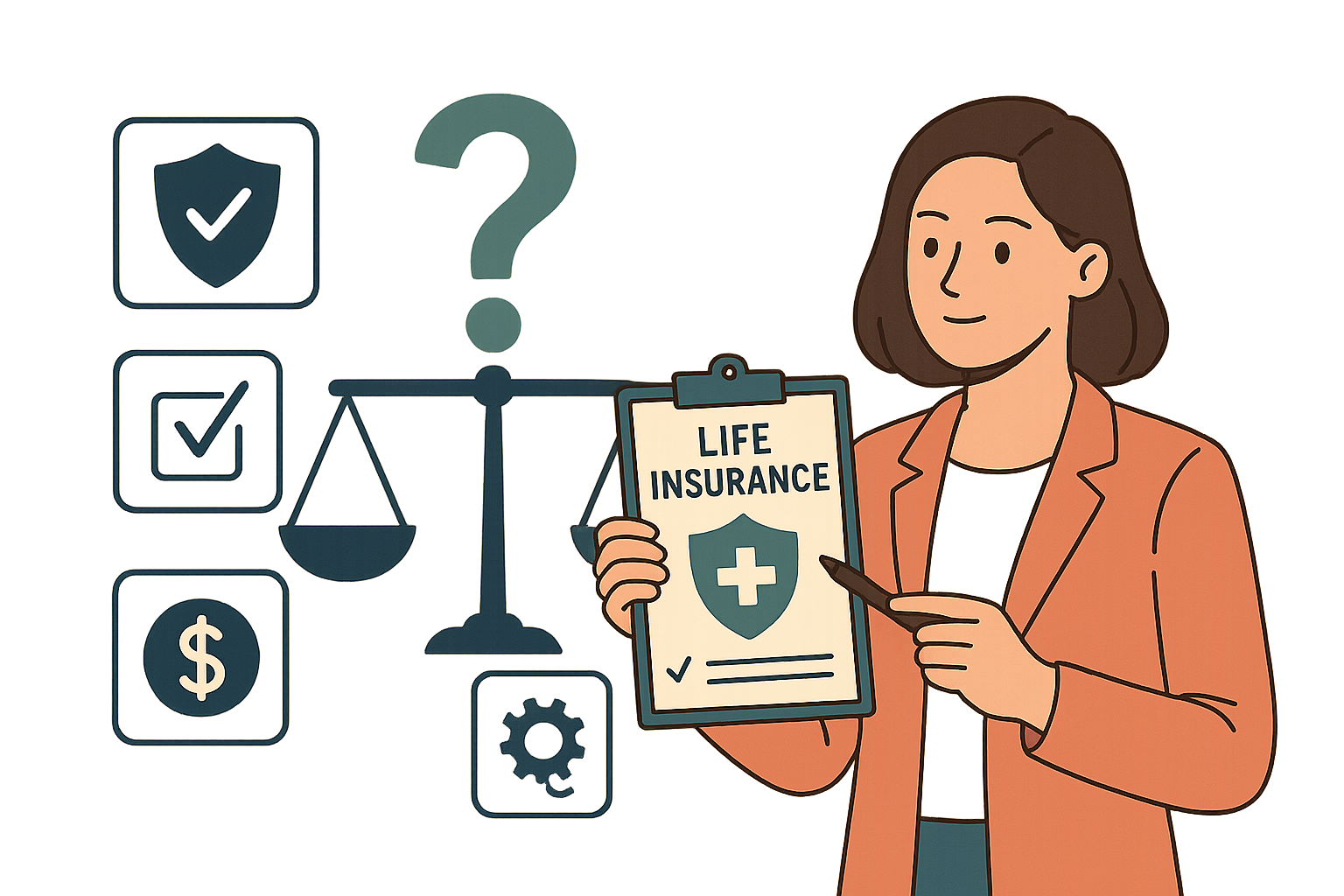- Customizable premium amount
- Includes cash value component
- Returns on market performance

Himanshu is a content marketer with 2 years of experience in the life insurance sector. His motto is to make life insurance topics simple and easy to understand yet one level deeper for our readers.
Reviewed By:

Sharan Gurve has spent over 9 years in the insurance and finance industries to gather end-to-end knowledge in health and term insurance. His in-house skill development programs and interactive workshops have worked wonders in our B2C domain.
Updated on Jul 14, 2025 5 min read
Universal Life Insurance: Overview
Universal Life Insurance is a permanent life insurance policy that invests the money into two components - lifelong coverage and investments. The life coverage provides death benefits to beneficiaries in case of the policyholder’s demise while your investments create a cash value component or savings pool.
In a universal life policy, a policyholder can change the premium amount as well as death benefits as per his financial needs. In case the investment underperforms the death benefits may be impacted. The death benefit fluctuates accordingly.
Universal life insurance can be cheaper than whole life insurance in certain instances. Unlike whole life insurance, the death benefits may vary as the returns depend on the market performance.
How Does Universal Life Insurance Work?
Having a clear understanding of the universal life insurance policy helps to make the right decision. The premium paid for universal life insurance has two components: life coverage and saving via investment.
The policyholder can increase or decrease the premium paid for this policy but the minimum amount that provides life coverage remains fixed. The extra amount paid by the policyholder gets invested and thus goes to the savings component.
As per the insurance experts, it is ideally good to pay a maximum premium in the initial years to accumulate a high cash value which can be either withdrawn or used to pay future premiums.

Say Hello to Arvind
Arvind is a 25-year-old non-smoker and a healthy person earning 7 lacs or above annually.

Bought Policy
Arvind purchased ₹1 crore Term Insurance for 25 years to secure his family.

Unfortunate Death
In the 8th policy year, Arvind suffered an unfortunate death.

Claim
His family received ₹1 Crore as a death benefit from the insurer.

After Claim
His dependents can use the death benefit amount to substitute the loss of income.
How Premiums of Universal Life Insurance are calculated?
The premiums of universal life insurance depend on several factors such as age, medical health, death benefits, cash value involved, hidden charges, etc.
Age of Policyholder
The age of an individual can affect their universal life insurance premium. The higher the age of the individual, the more the premium charged. Age has a direct influence on the premium because, with an increase in age, the risk of insurance companies also increases. That’s why it is recommended to have a life insurance policy at a young age.Medical health
The medical health of an individual impacts the premiums of a universal life policy. If an individual is suffering from any existing illness or disease the premium charged is higher. A healthy individual has to pay less premiums comparatively. This happens because of the overall risk involved in insuring an unhealthy individual.Death benefits
The sum insured or the death benefits that will be paid to the beneficiary has a major impact on the universal life policy premium. A universal life policy that provides coverage of Rs 1 crore attracts a higher premium as compared to a policy with Rs 50 lakh coverage.Cash value involved (Maturity Benefits)
A universal life insurance policy has two components - life coverage and cash value accumulation. Your premiums are invested in the market-linked funds. The cash value is the amount that the policyholder receives from the investments in market-linked funds if they survive till maturity.Hidden charges
The premium of universal life insurance also depends on the hidden charges associated with it. Some insurance companies include administrative, operational, or any other expenses in premiums. The higher the expenses more will be the premium and vice versa.
Advantages of Universal Life Insurance Policy
Here are certain advantages of a universal life insurance policy:
| Flexibility in premium payment | A policyholder has the option to choose the frequency of their premium payout. |
|---|---|
| Involvement of cash value | In universal life insurance, one part of premiums is invested in the market-linked funds which generate money. It is called the cash value component. |
| Death benefits | The involvement of death benefits secures the future of your loved ones financially. |
| Flexibility to change premiums | The policyholder has the flexibility to increase or decrease the premiums. |
| Tax benefits | Policyholders can avail of tax benefits on premium payment and death benefits paid are also tax-free. |
Disadvantages of Universal Life Insurance
As everything has its pros and cons, so is universal life insurance. Here are some disadvantages of buying universal life insurance.
| Fluctuating returns | The returns in universal life policy may fluctuate as it depends on the market conditions. |
|---|---|
| No payment of cash value on death | The cash value accumulated will not be paid on the death of the insured. Only death benefits are provided. |
| Additional charges | This policy may involve additional charges or expenses that make premiums costly |
| Market risks | Universal Life Policy involves a market risk component that can affect policy value |
Key Takeaways
- Your returns are market-linked which makes it a volatile financial instrument.
- Make sure to check the additional charges associated with this plan.
- You have the flexibility to choose your premium amount as per your financial requirements.
- In universal life insurance, a cash value is involved which creates a saving component.
What factors should be considered before buying a Universal Life Policy?
There are several factors which an individual should consider before buying a Universal Life Insurance:
Risk tolerance
Before buying a universal life plan one should consider their risk tolerance ability as returns depend on market conditions and how the fund chosen performs.Additional charges
Additional charges increase the premium paid. So it’s necessary to consider additional charges imposed by the insurer.Coverage Benefits
The coverage benefits should be enough to help your loved ones financially even in your absence.Age of the individual
The age of an individual affects the premium of the policy. One should consider age as a factor before buying the policy.Annual Income
The income level of an individual helps to decide which plan to choose. The premium should not create any kind of financial burden.
Conclusion
We have discussed universal life insurance, its pros and cons, and factors to consider while buying it. It helps you make the right choice. Sometimes people consider whole life insurance and universal life policy to be the same. These two policies are similar but not the same. The insurance premium in the whole life insurance remains the same for a particular tenure while it can be customized in universal life insurance.
If you are still confused about whether a universal life insurance plan is right for you then you can contact us at PolicyX.com. One of our insurance representatives will contact you shortly and help you choose a plan that best fits your requirements.
Universal Life Insurance : FAQs
1. How does a whole life policy differ from a universal life policy?
In the whole life insurance policy the premium amount remains fixed for a particular tenure but in a universal life policy, the premium can be changed.
2. How does universal life insurance work?
In universal life insurance, the policyholder’s money is divided into two components: coverage and cash value accumulation over time.
3. Can I withdraw the amount from the universal life policy?
Yes, you can withdraw the money from the universal life policy as per your financial needs.
4. Can I surrender my universal life policy?
Yes, you can surrender your universal life policy after paying surrender charges and any other charges if any.
5. Does universal life insurance have fluctuating returns?
Yes, returns in universal life policy may fluctuate as it depends on the market conditions and performance.
Life Insurance Companies
Share your Valuable Feedback
4.1
Rated by 8 customers
Was the Information Helpful?
Select Your Rating
We would like to hear from you
Let us know about your experience or any feedback that might help us serve you better in future.


Written By: Himanshu Kumar
Himanshu is a seasoned content writer specializing in keeping readers engaged with the insurance industry, term and life insurance developments, etc. With an experience of 2 years in insurance and HR tech, Himanshu simplifies the insurance information and it is completely visible in his content pieces. He believes in making the content understandable to any common man.


















Do you have any thoughts you’d like to share?